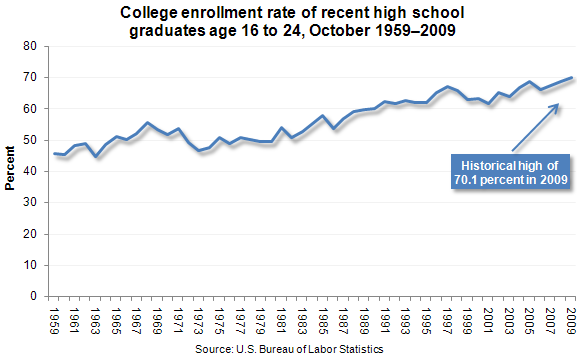General Discussion
Related: Editorials & Other Articles, Issue Forums, Alliance Forums, Region ForumsNot Looking for Work: Labor-Force Participation Hits 35-Year Low
The unemployment rate fell in August but for the worst of reasons: Many Americans stopped looking for work so they weren’t counted among the unemployed. What’s harder to tell is why they stopped looking. The political right chalks it up to laziness and government coddling, while the political left says people are giving up looking because a dysfunctional economy isn’t producing enough jobs.
The Bureau of Labor Statistics said the August unemployment rate was 7.3 percent, down a tick from 7.4 percent in July. The worrisome part is why the rate fell. The size of the workforce declined by about 300,000 and the participation rate fell to 63.2 percent from 63.4 percent—the lowest since August 1978. The participation rate is the number of people either working or actively searching for work as a share of the working-age population. It rose steadily over the years as more women entered the workforce before falling sharply in the 2007-09 recession, and it hasn’t recovered since.
Also disappointing was the payroll report. While the 169,000 added to employers’ payrolls in August wasn’t far below the 180,000 median prediction of economists surveyed by Bloomberg, there was a downward revision of 74,000 jobs to the previous two months’ reports. The government said June payrolls grew by only 172,000, rather than 188,000; July’s grew by only 102,000, instead of 162,000. In other words, while employment did grow in August, it was from a substantially lower starting point than previously believed.
Some quick reactions from observers:
• John Silvia, a Wells Fargo economist, noted that declining participation in the labor force is “bad for financing entitlements”—fewer workers to support recipients of Social Security and Medicare.
MORE...
http://www.businessweek.com/articles/2013-09-06/not-looking-for-work-labor-force-participation-hits-35-year-low
1StrongBlackMan
(31,849 posts)The number of people counted as “working aged” (15-79) that have left the labor market because they have reached retirement age (62+). (It’s somewhat disheartening that so many people cite to so many articles that fail to note that point … or if they do, it’s in a footnote on page 15.)
And I suspect that with the full implementation of ObamaCare, the number of people aged 55-62 leaving the labor market will, also, rise (further decreasing the PLR), as they find themselves with a pension and no healthcare insurance concern.
cthulu2016
(10,960 posts)The problem with attributing lower participation to demographics is that there is a big breakdown in 2008-2009 that we know was primarily due to the economy collapsing, not to demographics.
We are drawing an "L"—waterfall drop in 2008-2009 followed by flatness ever since.
hfojvt
(37,573 posts)but some of them may have been in their 50s and 60s, collecting a pension AND still working. So when the economy went into the crapper, they collected unemployment for a while and then say "screw it, I am 61 and have a pension, I can live on that pension."
People only leave the labor market IFF they think they can afford it, otherwise, they pretty much have to keep looking for work.
1StrongBlackMan
(31,849 posts)reached retirement age (62) in 2009.
This cohort also were heavily employed in union protected jobs, i.e., 30 years and old with full retirement. When the ecomony tanked, they left the labor force with no real ill-effect.
hfojvt
(37,573 posts)this is awful. They need to work. Labor force participation rate should be 99.44% dammit.
Of the 86 million people who were not looking for work in 2011, 53.3% of them were 55 and older.
Of the 88.3 million people not looking in 2012, 54% of them were over age 55.
Of the increase in the number of people not looking for work of 2.3 million, 83% of them were over age 55.
http://www.bls.gov/cps/cpsaat35.htm
I still say that a lower participation rate is not necessarily a bad thing at any age. I'd love very much to get married to Emma Watson tomorrow and call up my supervisor and say "fu%& you, I am not coming to work tonight."
bhikkhu
(10,718 posts)Not trying to make it good news, but a couple of factors - older workers aren't retiring as fast as projected. There has always been the expectation that the labor force participation rate would decline as our population ages, and particularly as baby boomers retire. At present, however, older workers aren't leaving the workforce as fast as expected. The biggest driver is that younger people aren't entering the workforce nearly as fast as previous generations.

Not to paint a rosy picture or oversimplify, but younger people are much more likely to go to college than previously, and put off working.

Probably both sides of that - older people putting off retirement, and younger people spending more time in school - are driven by economics.
Lets hope that the better educated younger population finds the opportunities they are preparing themselves for, and that retirement becomes a good option for the older generation at some point.